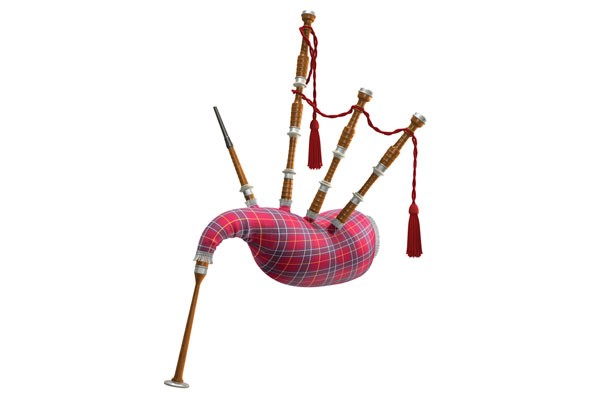It's a cacophony out here tonight at the Ohio Township Nature Center, off I-279. Nine bagpipers warm up, tune up, adjust their pipes, change reeds, run scales. The sound is overwhelmingly loud, like a flock of deranged geese all complaining at once. Faces glowing red as they blow, air filling small underarm sacks, the Macdonald Pipe Band prepares for the night's practice.
Three drones on the shoulder, pipe in the mouth, chanter held down and fingered, the pipers calm down a bit, the sound a steady whine of truck tires on asphalt. From the noise emerges the traditional nine-note scale, melodies played in that odd, utterly distinctive quacking sound.
Forming a circle, the pipers settle on a favorite, "Scotland the Brave." It's recognizable, but raw; it's still early in the evening.
"We're all drawn by the musical challenge," offers pipe major Bud Brizuela. A skilled musician who also plays trumpet and sax, Brizuela wandered into piping some six years ago when he picked up an $11 practice chanter — it somewhat resembles a snake-charmer's flute — in a Moroccan gift store. He discovered the nine-note scale was akin to that on a bagpipe.
Graduating to the big rig, Brizuela discovered what every novice knows: Wind endurance matters enormously. He also found he had to get used to blowing to fill the sack, then squeezing it to make the notes, two very distinct operations.
"It takes a lot of air to keep the bag filled at a constant pressure," Brizuela says. As the bag expels air to the three drones and the chanter, "It takes a precise mix of embouchure, endurance and squeezing to play. It took me six months before I could play a few songs. It's that challenging — and physically demanding."
It's also not cheap. A set of pipes averages $1,200, with full regalia (kilt, uniform vest, etc.) another $800. That's two large just to show up.
But it's worth it, Brizuela says, for the music and the Scottish heritage, although the latter is not a pre-requisite. (Brizuela, for example, has none of the Highlands in him.)
Part of the fun is the two-dozen-odd annual performances: church services, festivals, parades on St. Patrick's Day, Fourth of July, Labor Day. Private fundraisers are often on the docket, as are pipe competitions and Ligonier's Highland Games.
One of six area pipe bands, Macdonald has 25 active members, with an average practice night drawing half to two-thirds of the roster.
With the sound so loud they all wear ear plugs, the pipers form a circle to watch each other's fingers and keep time in a repertoire that includes traditional Scottish, Irish, French, Celtic, folk and military tunes. Tonight's fare includes "Minstrel Boy," "Green Hills of Tyro" and "Cabar Feidh."
As the band plays, master piper Nick Hudson runs about, using a chromatic tuner to test for pitch, adjusting pipes and reeds. A Carnegie Mellon-trained piper, Hudson "brings up our musicality," Brizuela says. "We're lucky to have such a great instructor."
Shaking his head, Hudson replaces one man's five-year-old reed, which keeps flatting out. Pipes are cranky, finicky instruments, easily thrown off by heat, humidity and playing pressure. One flat set of pipes can ruin a show — or cost the team competition points.
"It's one of the most temperamental instruments I've ever played," Brizuela says. "And it's a real discipline. You have to play every day."
A 10th piper wanders in, looking like an extra out of Braveheart or Lord of the Rings: bespectacled, bushy hair, bushy beard.
Brizuela calls the tune. "Let's do ‘When the Battle's Over' one more time," he says. "So — pipes up. And ..."
He taps his foot, they hoist and blow.
Playing strictly in unison — there's no improvising here, no jazz — the pipers start and stop on time.
"Much better," Brizuela nods.
Three more pipers straggle in, raising the complement to eight men, five women. (Once a male preserve, pipe bands, pipes and drums, now come in both genders.) In an instant, the ensemble is joined by five drummers, three of them women.
There's a great deal a lot of rattle and snare, mallets spinning in the air.
The sun has set, darkening the blue sky, painting the clouds orange. Lost in the melodies and precision, Macdonald music penetrates the quiescent dusk.
"The Boys of Wexford" ends with a jolt, the sound echoing off the green hills.
"I'm very pleased," Brizuela nods. "Pipes up."



















